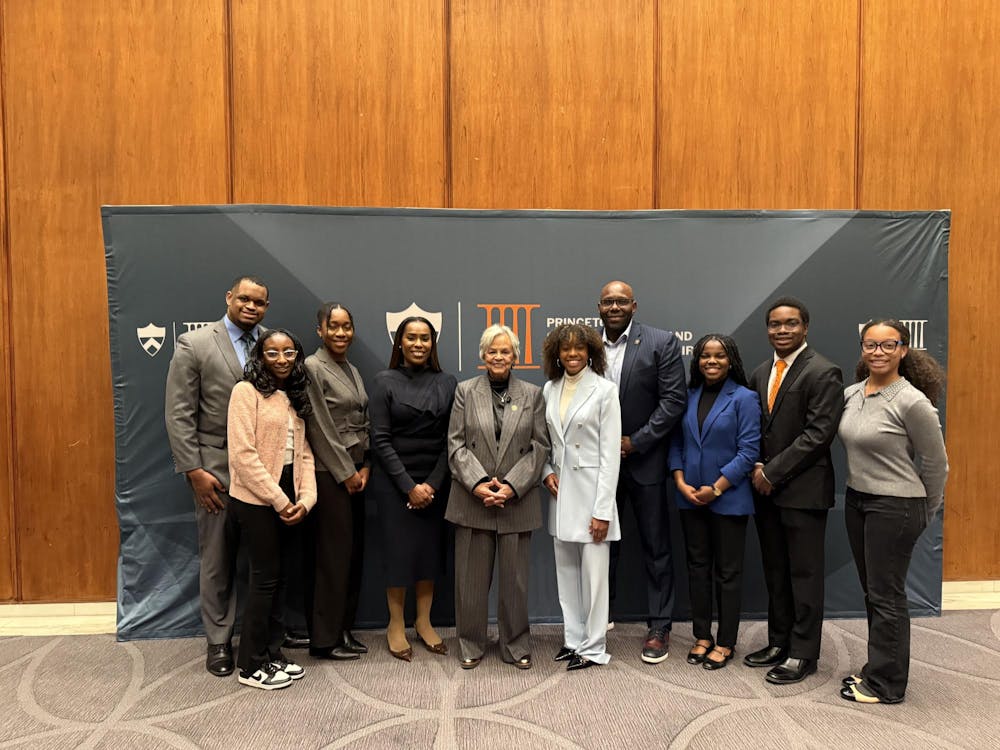People in the music industry from artist to songwriters to executives have banded together against Internet-music sharers, initiating court prosecution and sharing service shutdowns. However, Princeton group "Word is Born" is challenging this trend. Brian Root-Bernstein '06 and Nathan Domingue '06 compose, produce and share their music using the Internet.
Their music is what Root-Bernstein called "intellectual rap."
"I think Nate and I agree that what makes our rap different from the mainstream is its deemphasis of bitches, booze, and bling while taking a more intelligent viewpoint," Root-Bernstein said. "I consider rap to be basically contemporary poetry, and I try to treat our instrumentals and lyrics as such."
Composing 'intellectual rap'
The two work together to compose their unconventional songs. Root-Bernstein composes instrumental music on his computer through a process called sequencing with software called SONAR.
Though this process may seem removed from traditional composing, Root-Bernstein writes "on a simple bar and staff like any other composer," he said. Then he transfers his MIDI instructions to the sound lab computers where it is linked with high quality recordings of instruments. Domingue writes the lyrics and raps over the music. After the lyrics are added, Root-Bernstein does a final mixing, including adjusting levels and panning.
And although the two work on different aspects of the songs, the process is very collaborative. "We start with a concept for what a song is to sound like," Root-Bernstein said. "Sometimes I write the music first and then [Nathan] writes lyrics to go with it, and sometimes he writes lyrics first and I write music to match the feeling."
Root-Bernstein had played piano for eight years and saxophone for six years before he began composing music on his computer his senior year of high school. "I actually began composing because I felt too limited by only being able to play one instrument at a time, whereas composition allows me to play an entire orchestra if I want," he said.
Domingue gained recording experience working on the recording staff at WPRB, Princeton's radio station.

The two met playing ultimate frisbee, and last spring Domingue and Root-Bernstein discussed working on some songs together.
This semester they enrolled in MUS 316: Computer and Electronic Music Composition.
"Last year when we started talking about it I wasn't even sure we would actually do it," Domingue said. "We probably wouldn't have even started [if we hadn't taken that class]. [Brian] knew a little about composing, and I knew a little about recording but it's nothing compared to what we know now."
Root-Bernstein added, "The quality of our sound has improved exponentially over our first three songs."

They share their music and get their name out there using the Internet and music sharing. Their songs are posted on their website: www.princeton.edu/~broot/froshsuck.html.
The website address is in reference to their first song, "Bitch Please IV," which was a contribution to the tradition on the ultimate frisbee team during the Cane Spree time of writing smack poetry before the actual event. "Since we were planning on starting to make music soon anyway, we decided to start with that," Domingue said.
They are now two other songs posted as well: "Bring Da Funk" and "Straight Outta Princeton."
"Straight Outta Princeton" is the first and, thus far, only song they wrote and produced not for a class or for the frisbee team.
"I'm not sure that we have a unifying theme between the three songs, but if anything it's that you don't need to be a thug from the streets to enjoy rap," Root-Bernstein explained.
"Some people seem to find it funny that I'm white and I'm in a rap group, but that's precisely the viewpoint that I'm trying to refute. It has nothing to do with my skin color or lifestyle, I just happen to enjoy a certain style of music," he said.
"Straight Outta Princeton" is their most circulated song, Domingue said.
Their songs are also shared through iTunes.
"You can't download the songs off iTunes; you can only listen to them. It's a great medium because it's no different than playing the song for someone," said Domingue.
They are currently working on two new songs which they plan to have finished in the next two months. However, they are not sure if they will post them because they are trying to make a CD.
"We want to use music sharing promotionally and then sell our CD's, probably mostly among our friends," Domingue said. "If people hear our music, great. We're not trying to make money."
The two hope to finish the CD by the end of the year, depending on their schedules next semester. However, despite staying at school over fall break, they did not accomplish as much as they wanted to this semester.
"We do it because it's fun . . . It's just a hobby. I don't plan to make a job of it," said Root-Bernstein.







